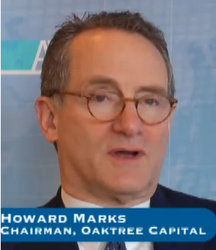 "We don’t expect to be able to hit the bottom. All we care about is that we’re buying cheap. If it gets cheaper, we buy more. Eventually, it’ll work out - so long as we are right.”
"We don’t expect to be able to hit the bottom. All we care about is that we’re buying cheap. If it gets cheaper, we buy more. Eventually, it’ll work out - so long as we are right.”
HOWARD MARKS is chairman of private equity firm Oaktree Capital, which he co-founded and grew into the biggest distressed-debt investor in the world.
Oaktree's assets under management amounted to about US$83 billion, according to an entry in Wikipedia a few years ago.
Oaktree employs approximately 600 people in Los Angeles (headquarters), New York, Stamford (Connecticut), Amsterdam, Frankfurt, London, Luxembourg, Paris, Beijing, Hong Kong, Seoul, Singapore and Tokyo.
Mr Marks has just put out a 'memo to clients' in which he asserts that in the stock market, history often repeats itself and investors should learn and take advantage of such situations.
Distilling from his decades of investing experience, the 66-year-old shared a particularly interesting view on how to spot bargains (see below). There are more insights contained in his entire memo, which is 10 pages long, and which you can read on the Oaktree website.
| If I were asked to name just one way to figure out whether something’s a bargain or not, it would be through assessing how much optimism is incorporated in its price. • No matter how good the fundamental outlook is for something, when investors apply too much optimism in pricing it, it won't be a bargain. That was the story of the Internet bubble; the Internet was expected to change the world, and it did, but when the optimism surrounding it proved to have been excessive, stock prices were decimated.
• Even with a bad “story,” the price of an asset is unlikely to decline (other than perhaps in the very short term) unless the story deteriorates further or the optimism abates. And if there's no optimism built into its price, certainly the latter can't happen. It was primarily this line of reasoning that allowed me to feel positive in the teeth of the financial crisis in late 2008. The outlook was as bad as it could get – total meltdown – and prices clearly incorporated zero optimism. How, then, could buying be a mistake (providing the world didn't end)? |
